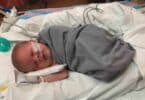
“All of the pieces are there, but the connections between neurons still need to develop,” Larsen told The Spectrum. “Most of those connections happen in the first years of life, but the can continue through the first two decades and even into the third.”
Larsen says “the brain develops from head to toe.” Visual pathways are formed. Babies start to gain control of their head and neck, then their arms, and then their core. Eventually, they start to develop hand-eye coordination, which helps them explore the world around them. Leg coordination then develops, which gives babies even more learning access to the world around them.
But brain development isn’t just about becoming more mobile; babies learn language, emotion, facial expressions, social interaction and so much more. Dr. Larsen says that much of that learning is based upon the reaction of their parents.
“The first language a baby learns is emotions – body language and facial expressions,” he said. “Babies will respond to a parent being happy or depressed. Babies learn how to react to new people by watching their parents. If parents are shy or uneasy, a baby will sense that. This can contribute to stranger anxiety. When parents are outgoing and friendly, a baby will tend to be as well.”
What’s more, Dr. Larsen says that it is the interaction with parents and caregivers that structures an infant’s brain. They learn about trust. They learn who to look for when their hurt, hungry or upset. But when abuse, stress and emotional detachment occur, a baby’s brain fails to strive. Dr. Larsen refers to these acts as “the enemy of healthy brain development.” And when these occur, any number of lifelong complications can arise.
Thankfully, Dr. Larsen also says that, for most parents, the things that promote healthy brain development happen naturally. For example, when cradling a baby in your arms, your face is “exactly the right distance for an infant who is trying to learn to focus.” And the high-pitched voice that most people use when speaking to babies is exactly the pitch they are able to hear.
“Things that come naturally – talking, tickling, gentle bouncing, and playing all help to develop pathways in a child’s brain,” Dr. Larsen said.
But if you’re looking for a little more direction in the things that you can do to promote healthy brain development, Dr. Larsen recommends that you follow the five “R”s: Reading, Rhyming, Routines, Rewards and Relationships.
“[Reading] can start as young as six months. Reading provides positive attention, and is a calming activity,” Dr. Larsen said. “Playing rhyming games fosters creativity…Stick to predictable family routines, especially around mealtimes and bedtime…Be sure to praise successes…Nurturing relationships can help buffer stress.”
And Dr. Larsen says it’s that last “R” that really helps out along the way because, well no parent is perfect.
“Kids are very resilient,” he said. “Brain development is a dynamic, ongoing process.”
Related Articles:
- Scientists to Start Mapping Babies’ Brains While in the Womb and After Birth
- Study: Autistic Types and Behaviors Determine Timing of Diagnosis
- Mess Happens When You’re A Parent!






